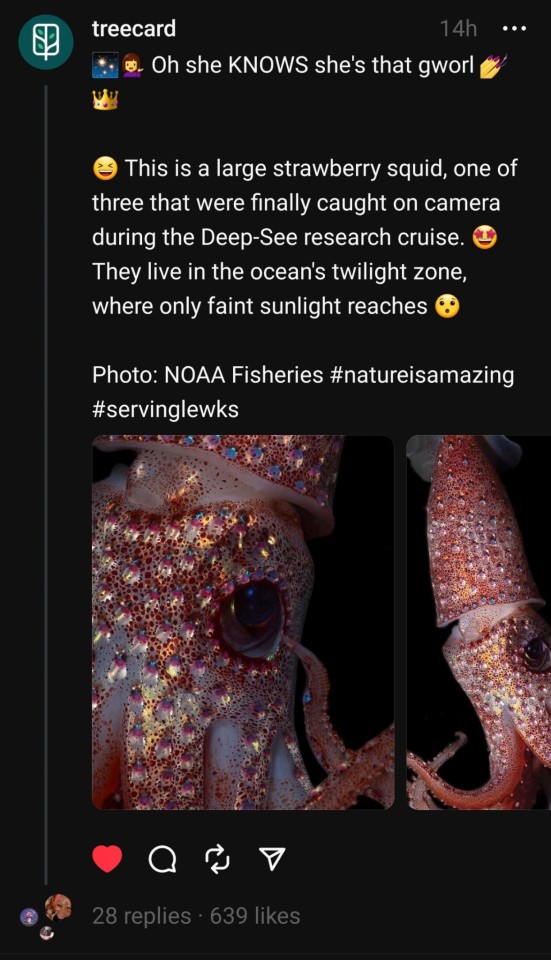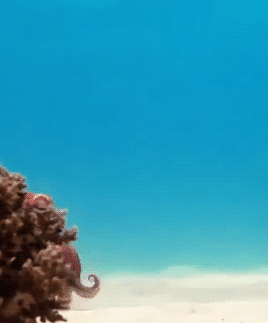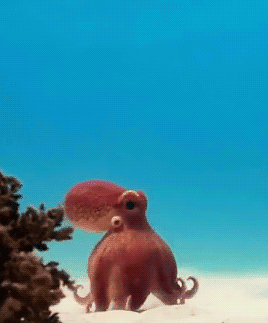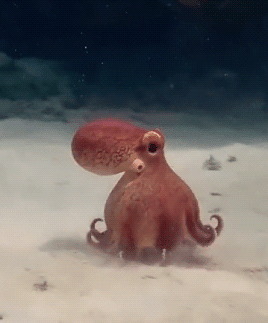Wake Up Babe New Fish Dropped




Wake up babe new fish dropped
More Posts from Mermaidfrenzy and Others



Zebra sharks got their name from the stripes they have as pups which become spots when they become adults.




Cutie-pie of the sea (x)
*Update: this is not a real octopus but a spy bot for research. In a BBC vid(here), the spy bot helps an octopus to protect itself from sharks.

the feminine urge to neglect all my responsibilities fail out of grad school and draw uncountably many nudibranchs
(watercolour wip)
The Sea Creature of the Day is the Basking Shark!!!

honestly these guys... ive seen so many people say that they're afraid of them and that's completely understandable but they're just the silliest lil guys to me and i love them so much. they only feed on much smaller creatures and are entirely harmless to humans- in fact, they've been known to circle around boats but entirely avoid divers! i've always liked to imagine that they just like saying hi 🥰
even though they're massive and slightly scary looking, these guys have never been documented to directly hurt a human and are just friendly lil guys who want to eat all of the plankton they can find, and i love that for them 💜
Shark Dump: Lemon Sharks!
Some of you seemed to enjoy my shark facts and honestly, if I can get the chance to rave about sharks, I will. So here are some shark facts starting with my favorite, Lemon Sharks!!
If you guys enjoy this, feel free to leave me a request with the name of a shark you'd like to learn about and I'll be happy to info dump on them. I'm thinking about posting one every Sunday (Shark Sundays!!! :D )
Technically I was supposed to post this earlier but I didn't lol oops-

Conservation Status: NEAR THREATENED
This cute guy here is a Lemon shark or Negaprion brevirostris! They get this name from their yellowish skin and yellow bellies but they can be anywhere from brown to olive colored. Lemon sharks are mostly native to the Atlantic Ocean and parts of the Pacific where they occupy coral keys, mangrove forests, bays and even docks. Most populations can be found in Gulf of Mexico, the West Indies, and the Caribbean.
They can grow up to 11 ft long which makes them one of the larger species of sharks but don't let their size scare you! These guys are mostly scavengers that hunt for food near sandy in-shore areas. Most of the lemon sharks diet consists of bony fish, crustaceans and stingrays although they occasionally snack on seabirds or smaller sharks. They hunt using electroreceptors on their nose, called ampullae de Lorenzini, which help them detect fish and other creatures, even buried in the sand.
(Remember, sharks don't have hands so they rely on their nose and mouth to explore the enviroment around them!)
Lemon sharks usually live in oceanic waters that are no deeper than 188 ft although some have been found in waters at depths of up to 300 ft. They are one of 43 sharks that can swim in freshwater but usually don't travel very far into these waters as they can't survive for long periods in them. If you see a lemon shark in freshwater, they're probably just there for a quick bite to eat before heading back to the ocean.
Fun Fact: Bull sharks are the only shark that can survive in both salt and fresh water! They're also one of the dumber sharks and will try to eat anything that fits in their mouths.
Despite how scary they look, lemon sharks are actually a favorite among divers and marine biologist because of their docile behavior! They rarely attack humans (As of 2011, researchers had found only 10 cases of lemon sharks attacking humans, and none of these cases were deadly), in fact, they are very shy and usually try to avoid us. Though if they do approach, they're usually just being curious and will bump you with their nose.

But my favorite thing about lemon Sharks? Once they get over their shyness, they LOVE getting belly rubs! They find the sensation very pleasant and will actively seek out the divers who pet them, even chasing other sharks away if they feel the diver’s giving them too much attention. Sometimes, if you rub their belly too much or if you stimulate the tiny sensory pores located on their snout, you can put them into something called tonic immobility.
Tonic immobility is a reflex that causes a temporary state of inactivity in an animal. Similar to hypnosis! Researchers aren't sure why sharks do this as it's usually thought to be a prey instinct so apex predators like sharks shouldn't have this. But most researchers have found that the sharks aren't stressed when they perform this behavior so it might just mean they're really relaxed! This is backed up by the fact that when in this state the shark’s muscles relax and their breathing becomes deep and rhythmic. Sharks usually enter tonic immobility in less than a minute and they can remain in this state for up to 15 minutes. It doesn't hurt them at all and researches use this to help subdue them.
Lemon sharks (like many other sharks) are imperative to keeping our reefs alive and healthy. Without them, we've already begun to see a major decline in coral reefs and seagrass beds. By taking these sharks out of the coral reef ecosystem, there's nothing to keep the larger predatory fish in check and they overfeed on the herbivores. With less herbivores, macroalgae expands and coral can no longer compete, shifting the ecosystem to one of algae dominance causing the reefs to eventually die out.
Now, back to lemon sharks and the most important fact I have about them: their conservation status.
Lemon sharks are considered to be near threatened. This means that they are likely to become endagered in the near future. This is because they are targeted by commercial and recreational fishermen primarily due to their highly prized fins. Their meat is also in high demand and is considered a delicacy in many areas. Further, the continuing destruction of their habitat has led to the severe decline of lemon shark populations.
But thankfully, there are steps already being taken to help protect these sweet sea puppies. The Florida Fish and Wildlife Conservation Commission prohibits the harvesting of lemon sharks in state waters. Any lemon shark that catches onto a hook is to be released immediately, either by removal of the hook from the shark or by cutting the shark free—whichever will release the shark quickest. Some countries are also slowly starting to put in protections for them as well.
You can also help! Many people view sharks as blood-thirsty monsters due to decades of slander campaigns and hollywood scare movies (I'm glaring at you Jaws). But we can change that view by showing the world just how beautiful and intelligent these creatures really are! The more informed people are about the sharks, the more we can do to help them. Just by reading this post and learning about lemon sharks, you're helping! Now, the next time you hear someone talking smack about sharks, you can smack them with some cool shark facts! Then hopefully with enough smacking, we can change how people see these lovely predators and get more support for their protection.

Vessel sound is temporarily causing hearing loss in squids
Globally, anthropogenic sounds have become louder and more persistent, however, little is known about how invertebrates detect and respond to human-made sound. Now, new research shown noise associated with boats causes causes temporal hearing loss in squids across different stages of their life cycle.
The hummingbird bobtail squid (Euprymna berryi) has a short lifespan of at least 6 months, which make them a convenient animal for lab studies. Hearing and behavioural observations were made by researchers before, during and after 15 minutes of vessel sound playback, to test how these squids react to noise pollution, and noted that these squids decrease their hearing sensitivity after exposure to noise, and particularly noise affected juveniles. Juvenile squids experienced an important hearing loss sensitivity after noise exposure between 400 and 800 Hz, while adult and mature squids decreased their sensibility after 200 to 600 Hz exposure, showing more resistence. All squids recovered auditory sensitivity within two hours.
Researchers aim the inclusion of cephalopods within management and policy, because anthropogenic activities and associated sound levels in the ocean are increasing, while the role sound plays in cephalopod life history is only just beginning to be understood.
Photo by Pascal Girard
Reference () Putland et al. 2023. Vessel sound causes hearing loss for hummingbird bobtail squid (Euprymna berryi). Frontiers in Marine Science



Daily Jellyfish: Day 4
Cauliflower Jellyfish
Fun Facts
Cauliflower Jellyfish are considered one of the most venomous in the medusa genus although it isn’t harmful against humans
They are considered a culinary delicacy and used for medical purposes in China and Japan
Their lifespan is 3-6 months

Daily Cephalopod #73

Daily Cephalopod #58
-
 jovialdelusionbouquet liked this · 1 month ago
jovialdelusionbouquet liked this · 1 month ago -
 axolotl-on-a-string liked this · 1 month ago
axolotl-on-a-string liked this · 1 month ago -
 anastasiacujoh reblogged this · 1 month ago
anastasiacujoh reblogged this · 1 month ago -
 drakefruitddg reblogged this · 1 month ago
drakefruitddg reblogged this · 1 month ago -
 drakefruitddg liked this · 1 month ago
drakefruitddg liked this · 1 month ago -
 eggplant436 reblogged this · 1 month ago
eggplant436 reblogged this · 1 month ago -
 eggplant436 liked this · 1 month ago
eggplant436 liked this · 1 month ago -
 defect-potato liked this · 1 month ago
defect-potato liked this · 1 month ago -
 knit-braid liked this · 1 month ago
knit-braid liked this · 1 month ago -
 forfucksheart liked this · 1 month ago
forfucksheart liked this · 1 month ago -
 the-dirt-eater liked this · 1 month ago
the-dirt-eater liked this · 1 month ago -
 the-creative-crow reblogged this · 1 month ago
the-creative-crow reblogged this · 1 month ago -
 the-creative-crow liked this · 1 month ago
the-creative-crow liked this · 1 month ago -
 666satanicanarchist69 reblogged this · 1 month ago
666satanicanarchist69 reblogged this · 1 month ago -
 strawberrydakry reblogged this · 1 month ago
strawberrydakry reblogged this · 1 month ago -
 rrivlet liked this · 1 month ago
rrivlet liked this · 1 month ago -
 puppythebarker reblogged this · 1 month ago
puppythebarker reblogged this · 1 month ago -
 dragonboyteeth reblogged this · 1 month ago
dragonboyteeth reblogged this · 1 month ago -
 ezraescapade liked this · 1 month ago
ezraescapade liked this · 1 month ago -
 blacktealcritter liked this · 1 month ago
blacktealcritter liked this · 1 month ago -
 wrymsorcery liked this · 1 month ago
wrymsorcery liked this · 1 month ago -
 aro-pancake liked this · 1 month ago
aro-pancake liked this · 1 month ago -
 simplysebby reblogged this · 1 month ago
simplysebby reblogged this · 1 month ago -
 faceinacrowd liked this · 1 month ago
faceinacrowd liked this · 1 month ago -
 mell-ominous reblogged this · 1 month ago
mell-ominous reblogged this · 1 month ago -
 fylixfrozyn reblogged this · 1 month ago
fylixfrozyn reblogged this · 1 month ago -
 actualmothfluffs reblogged this · 1 month ago
actualmothfluffs reblogged this · 1 month ago -
 actualmothfluffs liked this · 1 month ago
actualmothfluffs liked this · 1 month ago -
 jifridd reblogged this · 1 month ago
jifridd reblogged this · 1 month ago -
 freezedriedrose reblogged this · 1 month ago
freezedriedrose reblogged this · 1 month ago -
 freezedriedrose liked this · 1 month ago
freezedriedrose liked this · 1 month ago -
 simonomaly reblogged this · 1 month ago
simonomaly reblogged this · 1 month ago -
 simonomaly liked this · 1 month ago
simonomaly liked this · 1 month ago -
 nightmare-scenario reblogged this · 1 month ago
nightmare-scenario reblogged this · 1 month ago -
 the-lumpfish-king reblogged this · 1 month ago
the-lumpfish-king reblogged this · 1 month ago -
 autism-georg reblogged this · 1 month ago
autism-georg reblogged this · 1 month ago -
 sleepy-frog-lady reblogged this · 1 month ago
sleepy-frog-lady reblogged this · 1 month ago -
 shrimply-irresistible reblogged this · 1 month ago
shrimply-irresistible reblogged this · 1 month ago -
 mrconorae reblogged this · 1 month ago
mrconorae reblogged this · 1 month ago -
 dehydratedlydia reblogged this · 1 month ago
dehydratedlydia reblogged this · 1 month ago -
 willowplantcat reblogged this · 1 month ago
willowplantcat reblogged this · 1 month ago -
 keytobernadette liked this · 1 month ago
keytobernadette liked this · 1 month ago -
 nessies---girl reblogged this · 1 month ago
nessies---girl reblogged this · 1 month ago -
 juicepidemic reblogged this · 1 month ago
juicepidemic reblogged this · 1 month ago -
 juicepidemic liked this · 1 month ago
juicepidemic liked this · 1 month ago -
 cryptidcrone liked this · 1 month ago
cryptidcrone liked this · 1 month ago -
 hasellia reblogged this · 1 month ago
hasellia reblogged this · 1 month ago
